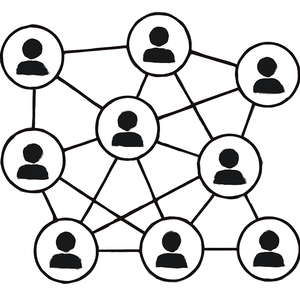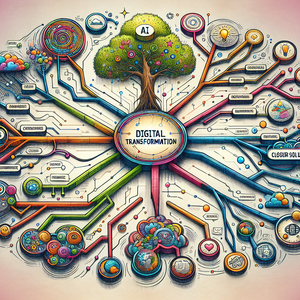The Rise of AI in Marketing Careers

AI is revolutionizing traditional marketing roles, creating a demand for new positions that blend creativity with technical expertise. The marketing profession is no longer confined to the realms of creativity and communication; it has expanded to include analytical and technical dimensions. For instance, roles such as AI-driven analytics specialists and marketing technologists are on the rise. These professionals are responsible for interpreting complex data sets, utilizing machine learning algorithms to predict customer behavior, and crafting personalized marketing strategies that resonate with target audiences.
The Role of Marketing Data Scientists
A prime example is the position of a Marketing Data Scientist. These specialists analyze large volumes of data to uncover consumer trends and preferences, using AI tools to enhance their predictive accuracy. Companies like Netflix and Spotify have leveraged these insights to tailor their content recommendations, significantly improving user engagement and retention. By analyzing viewer habits and preferences, these platforms can suggest content that is more likely to be consumed, thereby increasing customer satisfaction and reducing churn rates.
The Emergence of AI-Driven Roles
Beyond data science, other emerging roles include Customer Experience Managers, who leverage AI to optimize user interactions, and Content Strategists, who use AI analytics to create personalized content. These roles focus on understanding customer journeys and delivering tailored experiences that engage consumers effectively. As AI technologies continue to evolve, we can expect even more specialized positions to emerge in the marketing domain.
Emerging Skill Sets for the Future
As AI takes center stage in marketing, the skill sets required for success are evolving. Marketers must now embrace a hybrid skill set that combines traditional marketing principles with data analysis and technological proficiency. Key skills include: 1. Data Literacy: Marketers must be adept at interpreting data and using it to inform their strategies. Understanding how to utilize AI tools to analyze customer data will be crucial for making data-driven decisions. For instance, being able to interpret A/B testing results facilitated by AI can lead to more effective campaigns. 2. Technical Proficiency: Familiarity with AI-driven marketing tools, such as chatbots, predictive analytics software, and content automation platforms, will be essential. Marketers should be open to upskilling in areas like coding and machine learning to enhance their capabilities. Knowledge of programming languages such as Python or R could set candidates apart in the job market. 3. Creative Problem Solving: While AI can automate many tasks, the need for creativity remains. Marketers will still need to develop innovative campaigns and strategies that engage consumers on a personal level, leveraging AI to enhance, rather than replace, the human touch. Campaigns that blend AI insights with creative storytelling have the potential to resonate deeply with audiences.
The Future of AI in Marketing
The integration of AI in marketing is not without its challenges. Ethical considerations, such as data privacy and algorithmic bias, must be addressed as companies navigate the complexities of AI implementation. Marketers will need to advocate for responsible AI use, ensuring that consumer trust is maintained. For example, transparency regarding data collection and usage can foster a sense of security among consumers, which is paramount in building long-term relationships. Furthermore, as AI continues to evolve, the marketing landscape will likely see even more specialized roles emerge. For instance, positions focused on AI Ethics in Marketing or those dedicated to developing AI-Driven Customer Experience Strategies may become increasingly vital. Companies that prioritize ethical AI practices will not only enhance their brand reputation but also ensure compliance with evolving regulations.
The rise of AI in marketing careers is not just a fleeting trend; it represents a fundamental shift in how marketers operate. As AI tools become more prevalent, professionals in the field must adapt by acquiring new skills and embracing innovative approaches to their work. By understanding and leveraging AI, marketers can enhance their effectiveness, drive engagement, and ultimately contribute to the success of their organizations. Embracing this change is not only an opportunity for growth but also a necessity in a fast-evolving digital landscape. As we look to the future, those who are proactive in adapting to these changes will be best positioned to thrive in the new marketing paradigm. The integration of AI is not merely a technological advancement; it is a transformative force that will redefine what it means to be a marketer in the 21st century.
AI Marketing Data Analyst
Google, Amazon, Adobe
Core Responsibilities
Analyze consumer data using AI tools to identify trends and insights that inform marketing strategies.
Collaborate with cross-functional teams to develop data-driven campaigns and measure their effectiveness.
Generate reports that visualize key performance indicators (KPIs) and present findings to stakeholders.
Required Skills
Proficiency in data visualization tools (like Tableau or Power BI) and statistical software (like R or Python).
Strong understanding of machine learning concepts and their applications in marketing.
Excellent communication skills for presenting complex data findings to non-technical audiences.
Customer Experience Manager (AI Focus)
Salesforce, HubSpot
Core Responsibilities
Design and implement customer journey mapping initiatives that leverage AI technologies to enhance user experience.
Utilize AI-driven analytics to gather customer feedback and make iterative improvements to service offerings.
Work closely with product and marketing teams to ensure a seamless integration of customer insights into business strategies.
Required Skills
Expertise in customer relationship management (CRM) tools and AI analytics platforms.
Strong project management skills with the ability to lead cross-departmental collaborations.
Empathy and strong interpersonal skills to effectively address customer needs and concerns.
Content Strategist with AI Analytics Expertise
Buzzfeed, HubSpot
Core Responsibilities
Develop and execute content strategies that utilize AI insights to tailor content for diverse audiences.
Analyze content performance metrics through AI tools to refine future content development.
Collaborate with creative teams to ensure that content aligns with brand messaging and audience expectations.
Required Skills
Proficiency in content management systems (CMS) and AI-driven content optimization tools.
Strong writing and editing skills with a keen eye for detail.
Familiarity with SEO best practices and how AI can enhance search strategies.
AI Ethics Consultant in Marketing
IBM, Microsoft
Core Responsibilities
Advise organizations on ethical considerations related to AI use in marketing practices.
Develop frameworks and guidelines to ensure responsible AI deployment, focusing on data privacy and algorithmic fairness.
Conduct audits of AI marketing practices and provide recommendations for improvement.
Required Skills
Strong understanding of AI technologies and their implications for consumer rights and data ethics.
Excellent analytical skills and the ability to navigate complex regulatory environments.
Strong communication skills to effectively advocate for ethical practices within organizations.
AI-Driven Marketing Technologist
Salesforce, Oracle
Core Responsibilities
Implement and manage AI-based marketing tools and platforms to optimize campaign performance.
Collaborate with IT and marketing teams to ensure integration of AI technologies into existing marketing systems.
Monitor industry trends and emerging technologies to propose innovative solutions for marketing challenges.
Required Skills
Technical proficiency in marketing automation tools and AI technologies.
Experience with programming languages (like SQL or Python) and understanding of digital marketing channels.
Strong problem-solving skills and a proactive approach to technology adoption.


